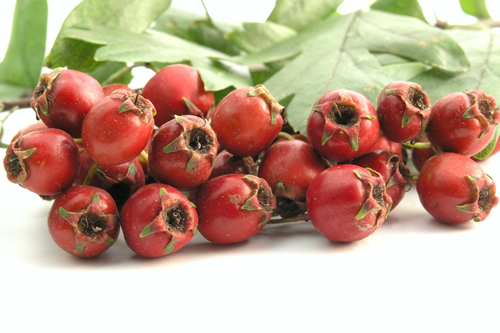Description
Botanical: Crataegus oxyacantha (also called Crataegus laevigata and Crataegus monogyna)
Other common names: Crataegus, English Hawthorn, Whitethorn, Mayflower, May Bush, Mayblossom, Quickset, May Tree, Thorn-apple Tree, Quickthorn
Country of Origin: Poland
Hawthorne Berry is a wonderful and trusted cardiac tonic that is used to lower blood pressure, reduce cholesterol and significantly enhance blood circulation to the heart and brain. It is used to strengthen the heart and manage angina, myocarditis (inflamed heart) and arrhythmia (irregular heartbeat).
Beneficial Uses:
Hawthorne Berry is an excellent cardiotonic that supports good heart health and protects it in a variety of ways. It is thought to be especially effective in the beginning stages of heart disease, as well as speeding up the recovery time after a heart attack.
It is also believed to strengthen a weak heart muscle associated with age, relieve pressure and tightness of the chest, ease angina and myocarditis (inflammation of the heart), as well as mild cardiac arrhythmia. The bioflavonoids found in Hawthorne interact with key enzymes in the heart to increase the pumping force of the heart muscle and eliminate arrhythmia.
Hawthorne is also characterized as having positive inotropic (affecting muscle contraction) effects leading to a strengthened heart rate. Although the Commission E no longer recognizes this use (due only to lack of clinical studies), Hawthorne Berry preparations have traditionally been shown to combat angina, a condition resulting from insufficient blood flow to the heart muscle
Good heart health is further supported by Hawthorne's rich flavonoids, which are thought to dilate and open up the blood vessels (as a vasodilator), allowing oxygen-rich blood to get to the heart and reduce the risk of a heart attack. It is thought that Hawthorne causes direct dilation of smooth muscle in coronary vessels thereby lowering their resistance and increasing blood flow.
Hawthorne Berry’s high vitamin C content helps to strengthen tiny capillaries in the brain, opening them and resulting in more nutrients and oxygen reaching the brain. Because of its vasodilating properties, Hawthorne helps to stimulate and improve blood circulation to the brain, as well as the heart, and herbalists have long used it to treat age-related memory problems. Scientific research has identified two ways in which the herb may work. It appears to lower cholesterol, and since there is less platelet aggregation from cholesterol (blood clotting) in the arteries, this action allows the blood to flow more freely and reach the brain's tissues.
Improved capillary health is also known to relieve conditions such as blood shot eyes, glaucoma, swollen ankles and varicose veins.
Hawthorne reduces cholesterol and regulates blood pressure (both high and low), but when taken for at least eight weeks, is thought to be effective in lowering pressure, since its action develops slowly. It also appears to increase the liver's conversion of LDLs (bad cholesterol) into HDLs (good cholesterol) that do not clog arteries, which helps to stop plaque formation. This is also beneficial in the treatment of arteriosclerosis, high blood pressure, heart attack and strokes.
Contraindications:
If diagnosed with angina, cardiac arrhythmias or congestive heart failure, use Hawthorne Berry only under the supervision of a physician. Large amounts (more than the recommended dosage) of Hawthorne Berry may result in sedation or dramatic drop in blood pressure. Signs of overdose include hypotension and arrhythmias. Using Hawthorne may potentiate the effects of some pharmaceutical heart medications - consult with your physician before using this product, as the medication dosage may need to be lowered.
Use with caution in cases of colitis and ulcers. Children and pregnant or nursing women should not use Hawthorne Berry unless directed by a physician. Taking Hawthorne and medicines used to treat or prevent blood clots together may cause your blood to be too thin, making you bleed or bruise more easily. Also, taking Hawthorne and Sulfinpyrazone (which is used to treat gout and may also be used to treat certain blood diseases) together may cause your blood to be too thin.


